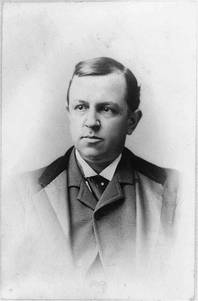 Henry W, Grady, 1889 (US Library of Congress). O'Reilly was very critical of Grady's advocacy of the 'New South'. Henry W, Grady, 1889 (US Library of Congress). O'Reilly was very critical of Grady's advocacy of the 'New South'. In 1883, the US Supreme Court ruled that the 1875 Civil Rights Act was unconstitutional, in what proved to be a devastating decision for African-Americans, especially those in the south. The Act of 1875 had prohibited racial discrimination in public places and its repeal severely limited the power of the federal government to guarantee equal status under the law to blacks. State legislatures throughout the south took advantage of the ruling to enact laws that legalised racial segregation in public places, such as schools, hospitals, and restaurants. Such discrimination had many defenders, especially the eloquent and highly influential southern orator Henry W. Grady. The southerner toured the United States in the late 1880s making speeches on what he called the ‘New South’. In these speeches he claimed that the northern media had had overplayed the poor relations between whites and blacks in southern states. Grady’s speeches were about more than race-relations; he also stressed the need for the south to industrialise and make itself a vital part of the United States. Those features of Grady’s thinking were laudable but his analysis of the ‘race problem’ was wilfully misleading and utterly supportive of a society that was grotesquely prejudiced against blacks. In December 1889 Grady spoke at Faneuil Hall in Boston on ‘The Race Problem in the South’. He told his audience, including former, and future, US President Grover Cleveland, that southern blacks ‘were happy in their cabin homes, tilling their own land’. He rubbished the claims of northern commentators, such as O’Reilly, that blacks were marginalised or subject to regular violence. Black ‘agitators’, he declared, were responsible for spreading this falsehood among gullible or anti-southern journalists. Grady evidently told his audience what they wanted to hear and his speech was interrupted for applause at least twenty-nine times. Over the following days, newspapers in Boston and across the north extolled Grady’s speech and the promise it offered of a rapprochement between the north and the former confederacy. O’Reilly was one journalist who disputed this consensus. In The Pilot he chastised Grady and the attitude which the southerner represented, writing that: ‘Never did oratory cover up the weaker points of a repulsive cause so well…’ O’Reilly did more than editorialise and, in his paper, he printed a series of articles which disputed the claims advanced by Grady and which highlighted the realities of southern life. Throughout the 1880s black communities had to contend with increasing violence from white mobs. One particularly brutal occurrence was the massacre of eight black men by over one hundred whites in Barnwell County, South Carolina, during December 1889. O’Reilly responded to the event with one of his angriest editorials: The black race in the South must face the inevitable, soon or late, and the inevitable is - DEFEND YOURSELF. If they shrink from this, they will be trampled on with yearly increasing cruelty until they have sunk back from the great height of American freedom to which the war-wave carried them. And in the end, even submission will not save them. On this continent there is going to be no more slavery. That is settled forever. Not even voluntary slavery will be tolerated. Therefore, unless the Southern blacks learn to defend their homes, women, and lives, by law first and by manly force in extremity, they will be exterminated like the Tasmanian and Australian blacks. No other race has ever obtained fair play from the Anglo-Saxon without fighting for it, or being ready to fight. The Southern blacks should make no mistake about the issue of the struggle they are in. They are fighting for the existence of their race; and they cannot fight the Anglo-Saxon by lying down under his feet. This article brought O’Reilly much criticism across the United States, some of which he printed in The Pilot. In reply to a claim from the St. Louis newspaper Church Progress that: ‘It is neither Catholic nor American to rouse the negroes of the South to open and futile rebellion’ he wrote: ‘True, and the Pilot has not done so. We have appealed only to the great Catholic and American principle of resisting wrong and outrage, of protecting life and home and the honor of families by all lawful means, even the extremest, when nothing else remains to be tried.’ O’Reilly further defended his editorial by claiming that blacks in the south were ‘fighting for the existence of their race’ and that if they failed they would be ‘exterminated’. The reality of southern life was a topic that O'Reilly returned to on many occasions. |
Ian Kenneally
Short articles about the life and times of John Boyle O'Reilly. Archives
March 2020
Categories
All
|